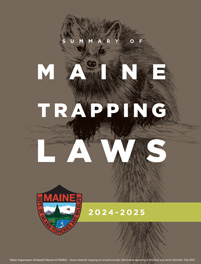

On this page:
A person is strongly encouraged to seek landowner permission before going onto someone else’s land for any purpose. The trapping laws, with some exceptions, require that a person have prior written permission from the landowner upon which the trap is to be set before setting traps:
Landowner permission is not required:
Note: Setting traps on privately owned land is not permitted if the landowner indicated they do not want a person to trap there, either by a conspicuously posted sign or by word of mouth.
When trapping on someone else's land, the following is not allowed unless specific permission is given:
People using trail and game cameras may not place a camera upon another person's private land without written permission. All cameras must be labeled with the camera owner's name and contact information.
The Inland Fisheries and Wildlife Landowner Relations Program is working towards enhancing the relationship between landowners and land users. With approximately 94% of the land in Maine in private ownership, everyone must respect all landowners and their rights as landowners. All landowner wishes have to be followed by all outdoor recreational participants to help ensure access and use of private property in the years to come.
Trappers are expected to abide by a higher standard of landowner permission than any of the other outdoor recreational participants. This standard is a law that requires written permission from the landowner before going on someone else's land to set traps.
Because trappers have done a great job abiding by this requirement, there is now a better understanding of trapping by landowners and the public in general. Contacting the landowners for permission does put an extra burden on the trapper. However, the one-on-one communication between the trapper and landowner plays a vital role in improving landowner relations - not only for trappers - but for all outdoor recreational participants.
You are not allowed to go on another person's land to trap beaver if the landowner has asked you not to go there, either verbally or by posted notice.
We receive several complaints each year where trappers have set up on a beaver colony that the landowner does not want removed. Please make every effort to avoid this type of conflict. You can do that by communicating with landowners prior to the opening of the trapping season as to what their wishes or concerns may be.
The law covering abuse of another's property contains several prohibited acts, but the one most likely to be encountered by a trapper is the cutting of trees or branches on the land of another. Cutting is not allowed without landowner permission.
We would like to thank all trappers for the excellent efforts they have displayed in helping us improve landowner relations. What you do does make a difference.
Copyright © 2024
All rights reserved.